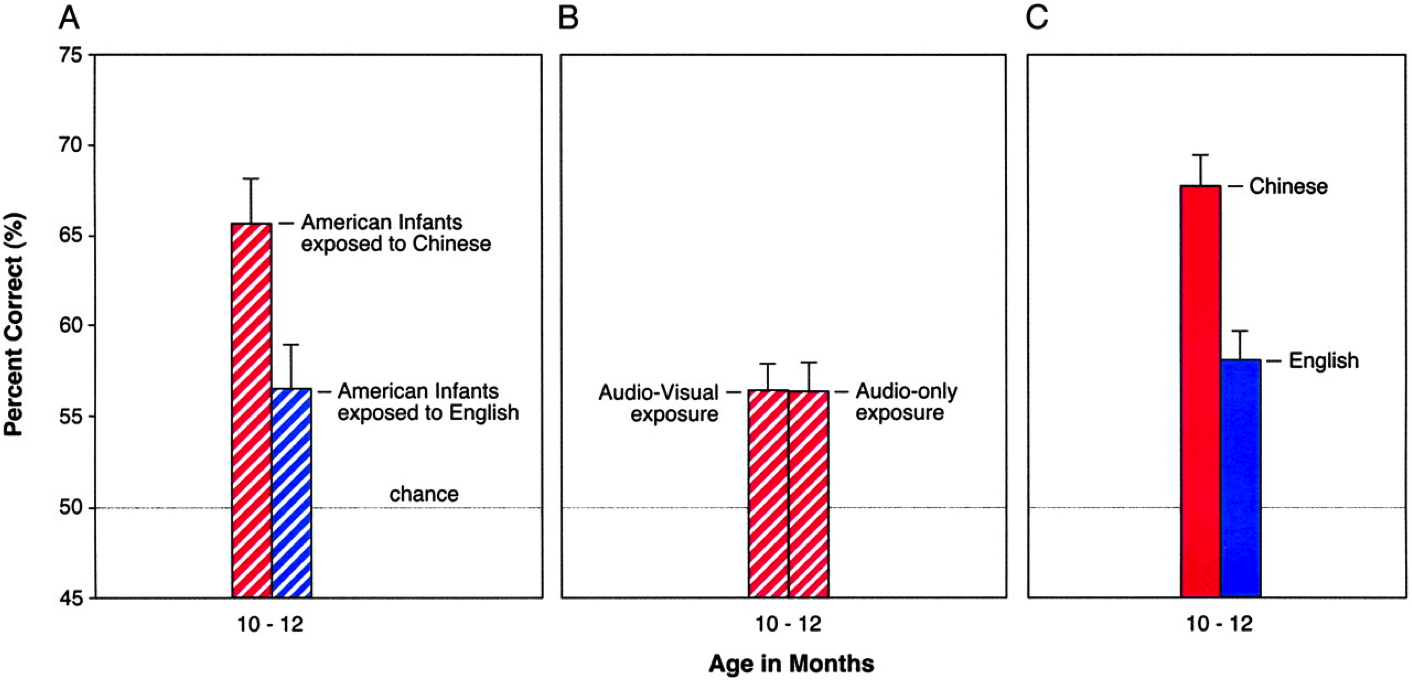Interesting question.
I think you'd need to split up the question a little further. Most of my answers rely on Lise Eliot's book What's Going on in There, which I unfortunately returned to the library on Friday, so I'm only able to paraphrase the few things I remembered or made notes of.
Will she be able to learn to speak another language?
As you already expect, no, she won't. Babies won't pick up any language if they aren't directly spoken to, if they cannot relate to what is talked about (p.386).
Will listening to other languages on the radio or tv help her with languages in a more general sense?
Possibly. Eliot mentions somewhere in the book that babies are able to distinguish a wide array of sounds, but that, as time goes by (by or starting around 6 months), they loose the ability to distinguish those sounds that don't appear in the language(s) they are hearing. One example she gives is that Japanese babies are able to distinguish the English letter R from other sounds in a way that many Japanese adults cannot as that sound doesn't exist in Japanese. However, this ability will be lost when the baby figures out that it won't need those sounds, so even if you exposed your baby to any specific language for the next two years, and she'd then start to learn that language a few years later, she will likely have lost the ability to distinguish the sounds of that language.
Also, for a baby, listening to foreign languages in the background may not be any different than hearing white noise - it's quite possible that they will need to be able to relate to what is spoken not only to grasp the meaning but also to understand that the sounds are part of a spoken language. I'm not sure if you'll find a lot of information regarding this aspect, as most research is geared towards actually learning to speak a language, and not building up an acquaintance with the language's sounds without acquiring active language speaking skills.
Anecdotally, listening to the radio (even though I didn't understand a single word in the beginning) actually helped me quite a lot when I learned a new language in my twenties - but I was 25, followed lessons in that language, and I was awake and consciously listening, which are very different circumstances from what you are envisioning.
Will listening to the radio or tv while sleeping have any effect?
I doubt it. If it had, listening to maths and physics lectures would pretty much be part of most people's sleeping habits, I guess. On the contrary, being exposed to constant noise, especially if it's as agitated as many tv or radio shows are, might actually be quite disruptive to your baby's sleep. I'm not sure if monotonous white noise is less disruptive or maybe even not disruptive at all (if quiet enough), I'd be interested if there are any studies regarding this aspect.
Eliot argues strongly for engaging your baby in conversation - talk a lot to them, both in terms of quality as well as quantity, listen to them, use age-appropiate language, speak clearly, make language learning fun, read to them, etc, and continue doing so throughout their whole childhood and youth.
Having a strong foundation in one's own mother tongue is beneficial to learning other languages, so if I were you, I would actually focus on that. Also, if you really want to help her learn a foreign language, start learning one yourself - not because you can then conversate with her in that language later on, but because there's nothing so motivating like a parent who demonstrates that learning foreign languages is a fun and natural thing to do!
